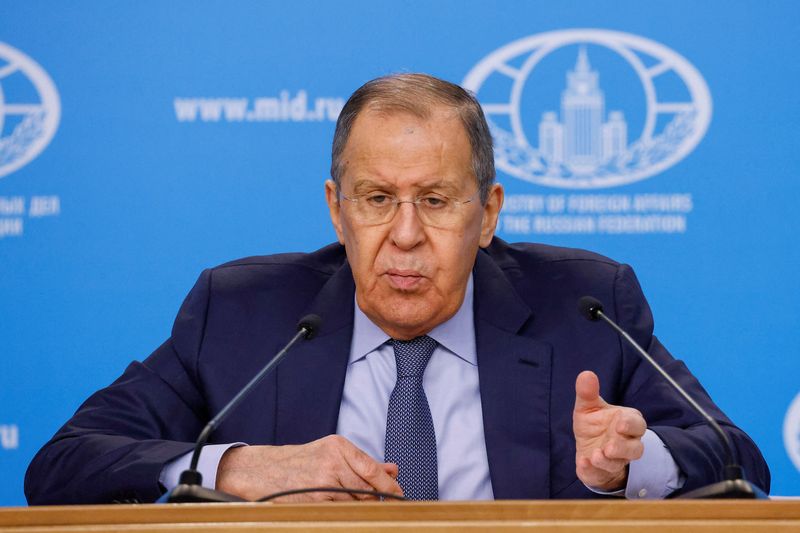MOSCOW/WASHINGTON (Reuters) -Russia on Thursday publicly rejected U.S.-Russian arms control talks for now because of U.S. support for Ukraine, a stance Washington said cast doubt on Moscow’s openness to a successor to the last treaty limiting their strategic nuclear arsenals.
Russian Foreign Minister Sergei Lavrov told reporters that Washington had proposed separating the issues of Ukraine, which Russia invaded in 2022, sparking a nearly two-year war, and the resumption of “strategic stability” talks on arms control.
But Lavrov said the U.S. proposal was unacceptable to Russia because of the West’s backing for Ukraine and accused the West of conducting a “hybrid war” against Moscow. However, he did not rule out the possibility of future arms control talks between the two, which possess the world’s largest nuclear arsenals.
“We do not see the slightest interest on the part of either the United States or NATO to settle the Ukrainian conflict and listen to Russia’s concerns,” Lavrov told a news conference, though he left the door open to Moscow’s position evolving.
“We do not reject this idea for the future, but we precondition this possibility on the abandonment by the West of its policy of undermining and not respecting Russia’s interests,” he said.
In Washington, a senior White House official said Russia may change its mind as the February 2026 expiration of the New START treaty approaches, though he said there were no guarantees. The treaty limits deployed strategic nuclear arsenals of both nations.
“We have to take Russia at its word … They’re refusing to engage bilaterally on these issues,” Pranay Vaddi, senior director for arms control at the White House national security council, said in response to a question at a think-tank event on Thursday. “It casts some doubt on Russia’s willingness to entertain a conversation about a New START follow-on or returning to New START compliance.”
“I think that they will want to come back to the table at some point, and ideally before expiration, but Russia could also be unpredictable,” Vaddi added.
New START’s lapse would leave the two nations with no nuclear arms agreement at a time when tensions between them are at the highest point since the Cuban missile crisis of 1962.
Lavrov accused the West of pushing Ukraine to use increasingly long-range weapons for strikes deep inside Russia. Such strikes have intensified in recent weeks, including an attack on the southern city of Belgorod that killed 25 people on Dec. 30.
Lavrov did not provide evidence for his assertion that the West was encouraging Ukraine to carry out such strikes but accused the United States of seeking military superiority over Russia.
Signed in 2010, the New START treaty caps the number of strategic nuclear warheads that the countries can deploy. Under its terms, Moscow and Washington may deploy no more than 1,550 strategic nuclear warheads and 700 land- and submarine-based missiles and bombers to deliver them.
(Reporting by ReutersAdditional reporting by Arshad Mohammed in Saint Paul, Minnesota, and David Brunnstrom in WashingtonWriting by Mark Trevelyan and Arshad MohammedEditing by Andrew Osborn and Matthew Lewis)
